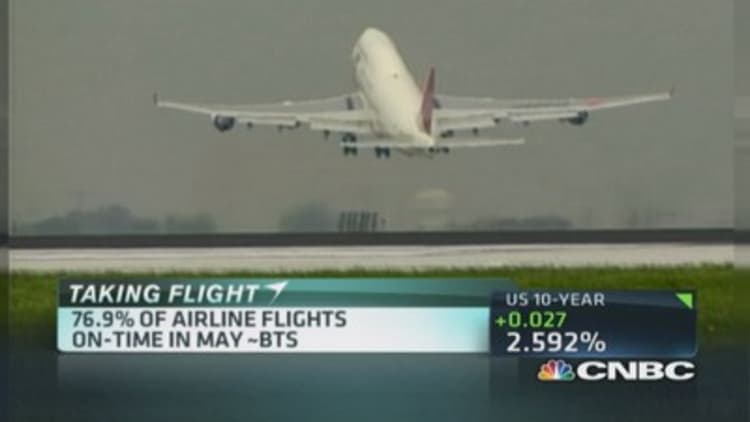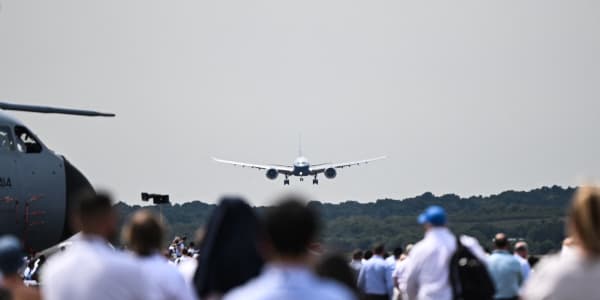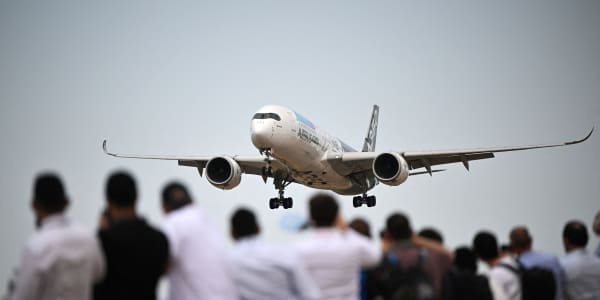As the Farnborough International Airshow approaches, investors and aerospace enthusiasts will be looking ahead with excitement. We take a look at what to expect from the week-long exhibition, from the classic battle between Airbus and Boeing to new trends in the industry.
Boeing vs Airbus: Big orders ahead?
The classic clash between Boeing and Airbus is a highlight of all major airshows, and Farnborough will be no exception.
"It takes center stage," Wayne Plucker, director of aerospace and defense at Frost and Sullivan, told CNBC in a phone interview.
Airbus has been under pressure in the run up to the show after Emirates canceled an order for 70 A350 aircraft. The delivery was placed in 2007 and was significant because Emirates was to be the launch customer for the twin-aisle aircraft which is due to come into service later this year. Emirates's order was expected to be completed in 2019.
Boeing and Emirates finalize $56B order for 150 777X planes
"The decision follows on-going discussions with the airline in light of their fleet requirement review," Airbus said in a statement as an explanation for the cancellation.
Emirates' president Tim Clark did however signal his intention to hold discussions with Airbus and Boeing later this year or next year about buying either an A350 or Boeing's Dreamliner, according to an interview in the Financial Times. This could be a big coup for Boeing as Emirates has never placed an order for the manufacturer's jet.
Analysts said Airbus has been unusually quiet, but it could have a big order book up its sleeve.
"At this point it looks like Airbus is taking a drubbing. Well, it's probably gamesmanship at this point. You may note how quiet Airbus has been. If I were a betting man, I'd say they are probably going to have a whole bunch of sudden sales at the airshow," Plucker said.
Digital in the clouds
Data analytics, faster broadband and more connectivity in the sky are all themes likely to be pushed at Farnborough this year.
"Digital technologies have been used by the industry for several years. But what is different is the industry's accelerating movement towards digital in new and different ways," John Schmidt, managing director of Accenture's North American Aerospace and Defense business, told CNBC in and email.
Schmidt said airlines are going to focus on how to use digital systems such as data analytics to improve aircraft tracking, reduce costs, and boost operational efficiencies.
Connected from the clouds: Go-ahead for 3G and 4G on planes
In addition to the airline benefit, customers are going to be craving high-speed internet while flying.

While many carriers already offer consumers the ability to connect mobile devices to broadband on an airplane, international regulators are looking to open up the possibility of using a mobile network on board.
In November, the European Commission, the European Union's executive arm, gave the green light for 3G and 4G services to be used on aircraft, while U.S. regulators considered a similar move.
"Now more than ever, aircraft passengers expect high-speed Internet connections in the air especially on long flights" Schmidt said.
Efficiency, efficiency, efficiency
Airlines are coming under increasing cost pressures, particularly from rising fuel prices and the need to have more efficient aircraft.
Oil prices have seen a spike in the last month on supply concerns coming from the violence in Iraq adding pressure to airlines.
US airlines 'afraid of competition': Norwegian CEO
Carriers are not only looking to save on fuel but are also looking to buy newer and more efficient aircrafts.
"The key is efficiency when it comes to airlines, fuel efficiency is killing them ," Plucker told CNBC in a phone interview.
"They never had great margins or great seat margins, but now instead of thousands or dollars per seat they are getting tens of dollars per seat."
European airlines are facing a tough financial situation with Lufthansa issuing a profit warning last month, and Air France-KLM posting a 445 million euro loss ($607.8 million) for the first quarter of the year.
Industry restructuring
The current aerospace industry of government-controlled airlines and bloated companies is "not viable in the long term", according to Ed Hunt, senior consultant at IHS Jane's.
Gulf airlines pose challenge for Europe
Currently, different states own large portions of major carriers. The French, German and Spanish governments own around 26 percent of Airbus' stock, while the Italian government owns a 30 percent stake in Finmeccanica.
Hunt also said the industry is saturated with too many players and that debate around restructuring in the sector is likely to take place.
"The problem is the European aerospace industry employs more people than the U.S. equivalent but only 40 percent of its revenues. There are too many of the same company employing too many people. There is going to be a need to do something."
- By CNBC's Arjun Kharpal






